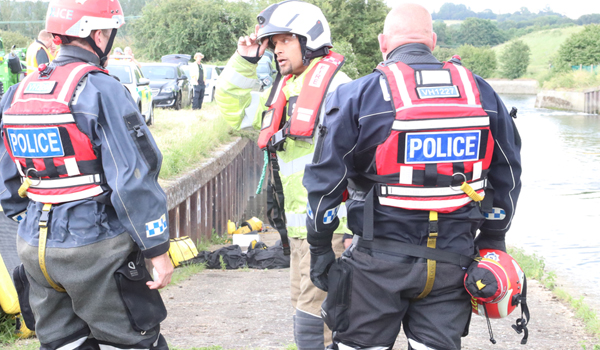Emergency services practise life-saving skills in preparation for summer
Skilled water rescue emergency teams have taken part in a training event involving a rescue from a partially submerged car in the River Lea, on the Hertfordshire-Essex border.
The planned exercise, code named Exercise Titan, involved crews from Hertfordshire Constabulary, the East of England Ambulance NHS Trust (EEAST), Hertfordshire Fire and Rescue Service and the Environment Agency, who worked together to rescue two people from an over-turned car under fast flowing water conditions.
The exercise scenario involved two people driving close to a grass verge on the River Lea, with loud music playing.
In the scenario, police receive a report via the non-emergency number 101 that a vehicle was driving off road near the river.
Five minutes later, there was a further call received from the driver of the vehicle after the car had flipped off the verge and into the river, landing on its roof.
Hertfordshire Constabulary Chief Constable Charlie Hall, national policing lead for JESIP (Joint Emergency Service Interoperability Programme), said: “The exercise, which was performed by multiple units of our front line, demonstrated that when we are called up on for such an emergency response, that we are well equipped with both training and knowledge to deal with the incident.
“Every incident is going to be different but if we as a group of emergency services can be in the best place possible for when something like a water rescue was to occur, then we can feel better prepared to respond.”
Graham Grover, a firefighter from Hertfordshire Fire and Rescue, and multi-agency training and exercise coordinator, Local Resilience Forum, added: “Exercises such as this one ensure that first responders in the area can work together for the best outcome.
“In this case we were lucky to be able to challenge our crews to respond to an emergency which becomes more common in the Summer months, a water-based rescue.”
Emergency services across England are required to take part in regular training exercises as part of the Civil Contingencies Act (2004) and strive to create conditions that replicate possible real-life events as closely as possible.
In this instance the event took place on Environment Agency land under carefully controlled conditions, and included careful preparation to ensure that the waterways were safe for emergency workers to work in, and that there was no impact on the water or the surrounding environment.
Emergency crews were careful to ensure that the car used in the event was classified as ‘clean’ to ensure that there was no possibility of damaging or contaminating the water, or the countryside surrounding the exercise.
Jon Alder, training and exercising adviser for the Environment Agency said: “We were pleased to be invited to work with our emergency response colleagues to ensure that our water was safe for their work, and that the exercise didn’t contaminate or damage the waterways.
“Although the car used in the exercise had been drained and cleaned off oil and any other potentially polluting fluids, we were also able to test our pollutant barrier and video around the accident scene to test our response to tackling pollutant events.”
Kate Vaughton, deputy chief executive officer and director of integration at EEAST, said: “As a frontline emergency service, we are continually taking part in training exercises such as this one to ensure we provide the best possible response in a real scenario.
“Joint exercises with our colleagues in the fire service, police and other agencies allow us to build effective relationships between blue light services, which are vital when we need to work together to save lives.
“We were pleased to take part in this water-based training exercise, which will mean that together we are better prepared to respond should we be called to a real life incident in the future.”
Deputy Chief Fire Officer Andy Hopcraft said: “As we approach the summer months we see an unfortunate increase in the number of water-based incidents we are called to, and although we’d prefer not to see these incidents – I’m impressed by the commitment our teams show in training and preparing for these events.”


